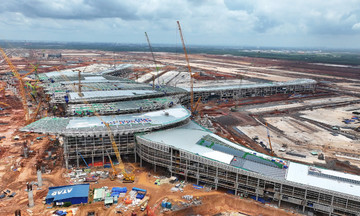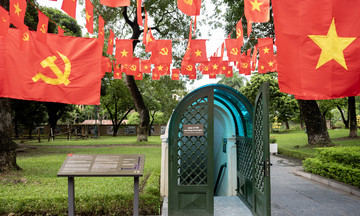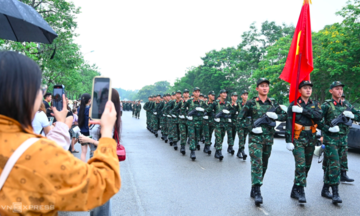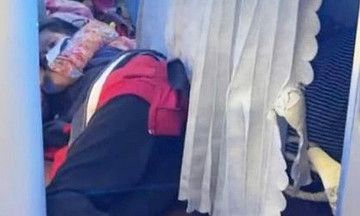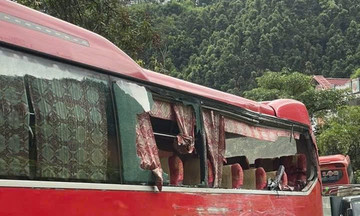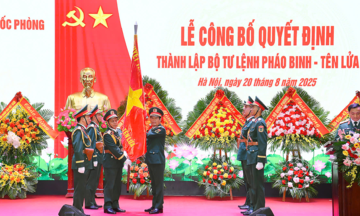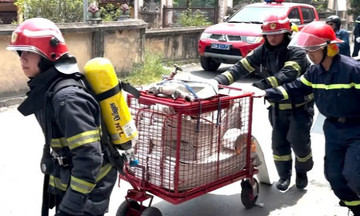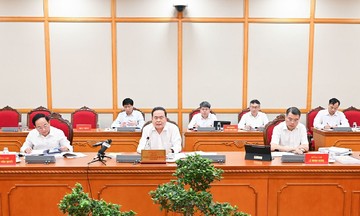Nguyen Son Ha, born Nguyen Lac in 1894, hailed from a poor farming family in Son Tay, Hanoi. His father, a martial arts enthusiast and patriot, joined the Black Flag Army against the French and was subsequently imprisoned. Upon his release, he moved his family to Hai Phong to seek a livelihood.
In the early 20th century, Hai Phong was one of northern Vietnam's largest cities, a key location for French colonial exploitation, and a hub of rapid industrial development. Nguyen Son Ha found employment at the French-owned Sauvage Coltu paint company.
According to Nguyen Son Ha's youngest daughter, Nguyen Son Truc, her father completed primary school and was literate in Chinese characters, enabling him to access knowledge from books and newspapers. Outside of work, he often invited French acquaintances for coffee to practice the language. He also took advantage of his employer's absences to study technical books at the paint factory.
At 22, having mastered paint-making techniques, he sold his bicycle to open a small paint shop named Resistanco.
The prefix "resistan" in Resistanco, besides its French meaning of "durable, strong", also connotes "resist" or "resistance". This word was also used by the French when referring to the Vietnamese resistance against the Americans. Researcher Pham Tue suggests Nguyen Son Ha may have chosen the name to express his patriotism and defiance of colonial rule.
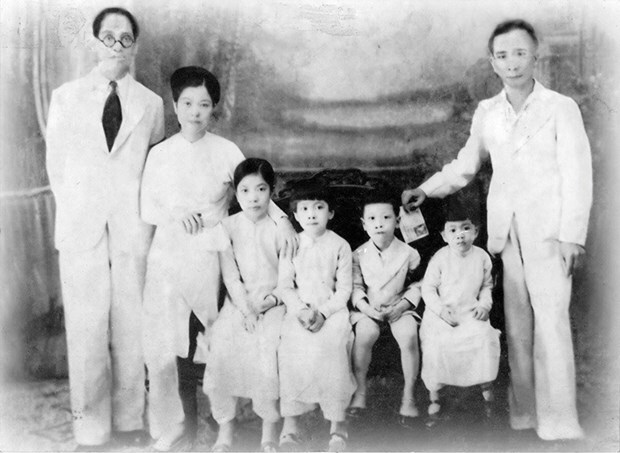 |
Nguyen Son Ha's family in Hai Phong. Photo: Family archives |
Nguyen Son Ha's family in Hai Phong. Photo: Family archives
At that time, paint ingredients were primarily imported, resulting in high prices and a French monopoly. To compete, Nguyen Son Ha sourced local materials like tung oil and pine resin. His products gained popularity due to their affordability and superior quality. Resistanco became a renowned brand throughout Indochina.
Besides paint, his business also produced cleaning fluids, soap, and floor wax. By 1946, he owned a 7,700 m2 factory in Lach Tray, Hai Phong, with a distribution network spanning various provinces. His name was included in a 1943 publication by the Governor-General of Indochina, honoring prominent Vietnamese individuals.
Patriot Phan Boi Chau dedicated a couplet to him: "Hoa hoc bac Au Truong, to diem son ha tam huu tat/ Cong khoa ton Viet chung, chuyen di thoi the thu vi co," which translates to: "Taking the chemistry of the Europeans, he adorned the land and rivers with his inherent patriotic heart/ Using Vietnamese technology, he changed the times with his own hands."
A national capitalist
Having risen from poverty, Nguyen Son Ha dedicated much of his wealth to helping the less fortunate. In 1929, after being elected to the Hai Phong City Council, he joined numerous charities and established literacy classes. "Having succeeded through self-education, my father believed that achieving meaningful results required literacy. He was deeply committed to eradicating illiteracy," Nguyen Son Truc recounts.
With 90% of the Vietnamese population illiterate, he learned about the establishment of the Association for the Propagation of National Language in 1938. He traveled to Hanoi to meet with President Nguyen Van To and requested permission to establish a branch in Hai Phong. With support from Hai Phong's intellectuals, the literacy movement expanded beyond the port city to Quang Yen, Uong Bi, Hon Gai, Kien An, and beyond.
During the 1944-1945 famine, which claimed millions of lives, Nguyen Son Ha opened 7 relief stations along Lach Tray street, using his family's rice to aid those in need. "Witnessing the people's suffering, my father couldn't bear it, constantly seeking an ideal, a path to alleviate their hardship," Ms. Truc recalls.
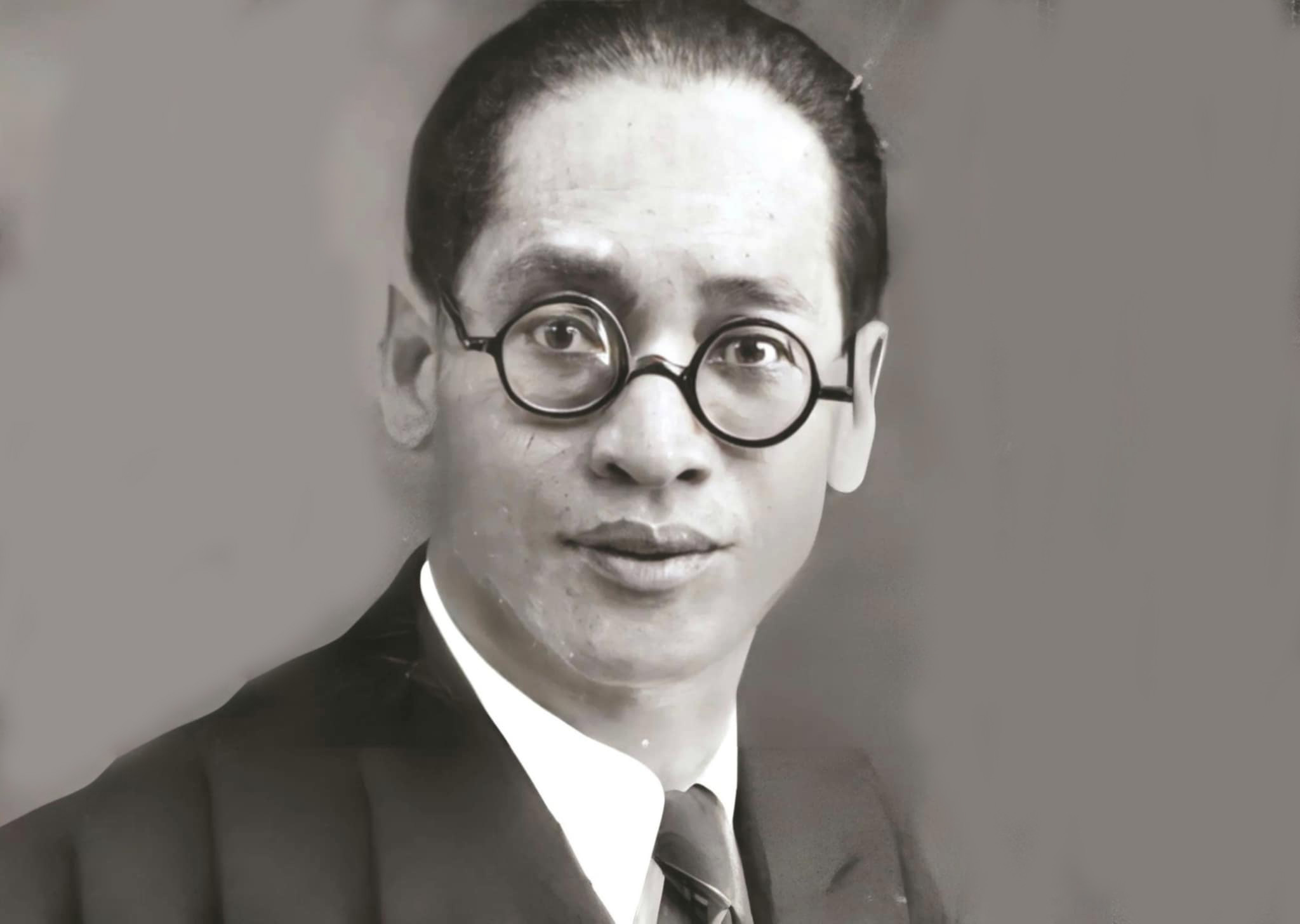 |
Portrait of patriotic businessman Nguyen Son Ha (1894-1980). Photo: Archives |
Portrait of patriotic businessman Nguyen Son Ha (1894-1980). Photo: Archives
When the Japanese overthrew the French and installed the Tran Trong Kim government in 3/1945, Nguyen Son Ha briefly served as Deputy Mayor of Hai Phong. However, within three months, he recognized the puppet regime's weakness and the cruelty of the fascists, prompting his resignation.
Around this time, he grew to admire the revolution led by Nguyen Ai Quoc (Ho Chi Minh). Through his eldest son, Nguyen Son Lam, a progressive intellectual, he encountered revolutionary literature and gradually embraced the revolution as the path to national liberation, offering his clandestine support.
He allowed his son to use family funds to purchase weapons for the national salvation forces and contributed 45,000 Indochinese piastres to prepare for the general uprising. He also permitted his sister, Nguyen Thi Thao, and brother-in-law, Tuong Dan Bao, to use funds from his Saigon agency to organize a train to transport hundreds of political prisoners from Con Dao back to the mainland, including Ton Duc Thang, Le Duan, and Hoang Quoc Viet, before the French reoccupied southern Vietnam. After the August Revolution, he donated 105 taels of gold during "Gold Week," responding to President Ho Chi Minh's call.
Upon the formation of the Provisional Government, General Vo Nguyen Giap, on behalf of the government, invited him to serve as Minister of Economy. He declined, citing his limited education and expertise, fearing he would negatively impact the national economy and people's livelihoods. He was later elected to the National Assembly in 1946.
Industrial talent in the resistance base
When the French launched their attack to retake Hai Phong, Nguyen Son Ha moved his family to Dong Trieu. While there, they received the devastating news of his eldest son, national guard Nguyen Son Lam's, death. "My father deeply mourned my brother's loss, further solidifying his resolve to join the resistance base and contribute to the fight," Ms. Truc explains.
Leaving behind his vast estate, plantations, homes, and comfortable life for the Viet Bac resistance base, his wife understandably expressed concern. He reassured her, showing his hands, "With these two hands, our family won't go hungry." Enduring hardship, including the loss of two more sons due to lack of medicine, he maintained his faith in the revolution and refused all French enticements to return.
Seeing soldiers falling ill after fighting in the rain, he developed a paint that could coat fabric to create raincoats. These coats not only provided rain protection but also warmth, defense against forest leeches, and served as makeshift bedding. President Ho Chi Minh wrote to thank him, expressing his hope that he would produce them in "large quantities, of good quality, and at low cost" to inspire other Vietnamese technologists.
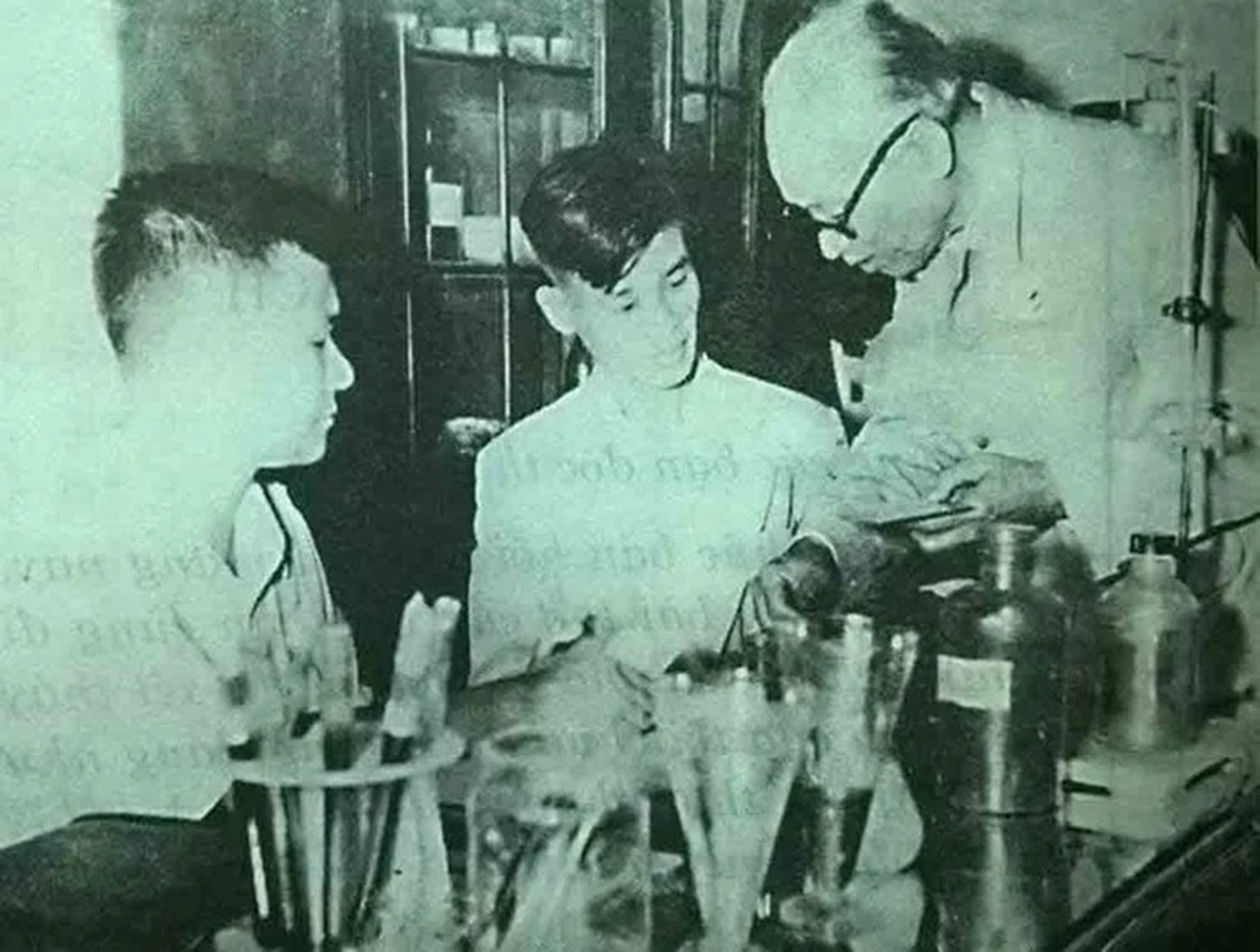 |
Nguyen Son Ha instructing technicians at the Hanoi Department of Industry. Photo: Archives |
Nguyen Son Ha instructing technicians at the Hanoi Department of Industry. Photo: Archives
At the resistance base, Nguyen Son Ha also developed insulating plastic fabric and a special paint made from pine and cajuput resin to coat bare electrical wires, ensuring secure communication. He also created long-lasting, energy-rich rations and eucalyptus cough drops for the troops.
Later, during the 3rd National Assembly session in 1953, he stated: "We in the industrial and commercial sectors were once scorned by the colonialists, unable to raise our heads. Therefore, since the outbreak of the resistance war, genuine, patriotic industrialists and businessmen have brought their entire enterprises to the liberated zones to join the fight. That is our commitment to the cause of national liberation."
After peace was restored in North Vietnam, Nguyen Son Ha returned to Hanoi and continued contributing to the paint industry. He served as a National Assembly delegate from the 2nd to 5th sessions, received the First Class Independence Order and the Second Class Resistance Order. His name became a symbol, as poet Huy Can wrote: "A hundred years, the name Son Ha resounds. A thousand years, the two words 'Motherland' belong to all. Using paint to adorn the land and rivers. Making Vietnam, our motherland, shine brightly."
He donated all his assets, including his Hai Phong factory, to the state. He also donated a plot of land and a row of houses on Lach Tray street to build a school. He offered several rooms in his villa at 49 Lach Tray street to officials for housing. "The state will take care of everything later, so why keep it?" he explained.
After his passing in 1980, the villa became a memorial and museum showcasing his belongings. Many streets are named after businessman Nguyen Son Ha.
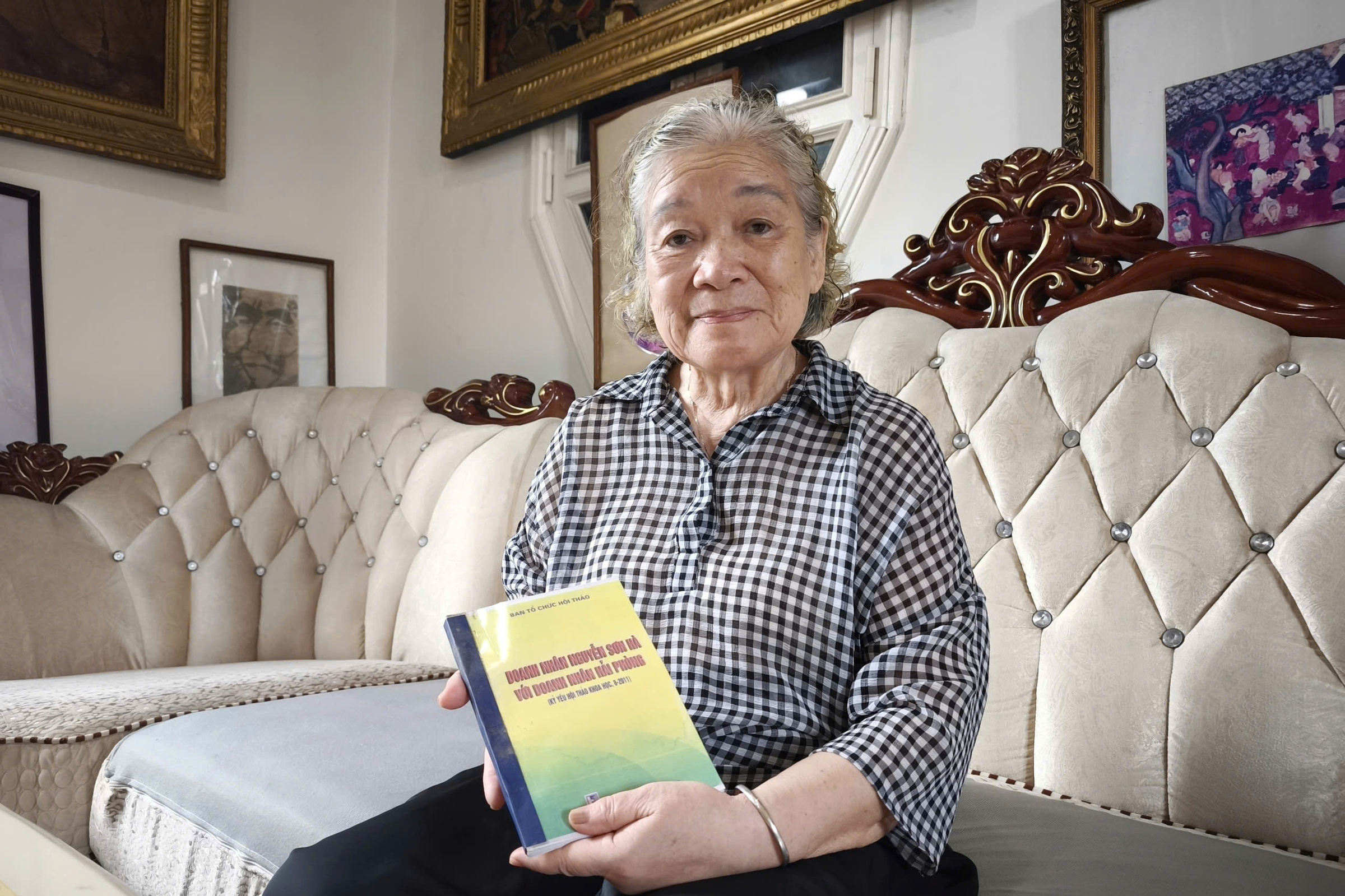 |
Nguyen Son Truc, 81, the youngest daughter of Nguyen Son Ha. Photo: Le Tan |
Nguyen Son Truc, 81, the youngest daughter of Nguyen Son Ha. Photo: Le Tan
His youngest daughter has many memories of her father, but she most remembers his positive thinking and lack of complaints. "When he ran the factory, the most skilled worker he trained was lured south by another employer. This was illegal at the time, and lawyers advised him to sue. However, he refused, choosing instead to train someone even more skilled. He said competition fosters progress," Ms. Son Truc recalls.
In his free time, Nguyen Son Ha spent time with his children, sharing historical tales and fairy tales. He was particularly fond of painting. During a business trip to the Soviet Union, Chairman Mao Zedong gave him money, which he used to purchase a book on Chinese national painting. "He inspired me to pursue a career as an artist," Ms. Truc says.
Le Tan



